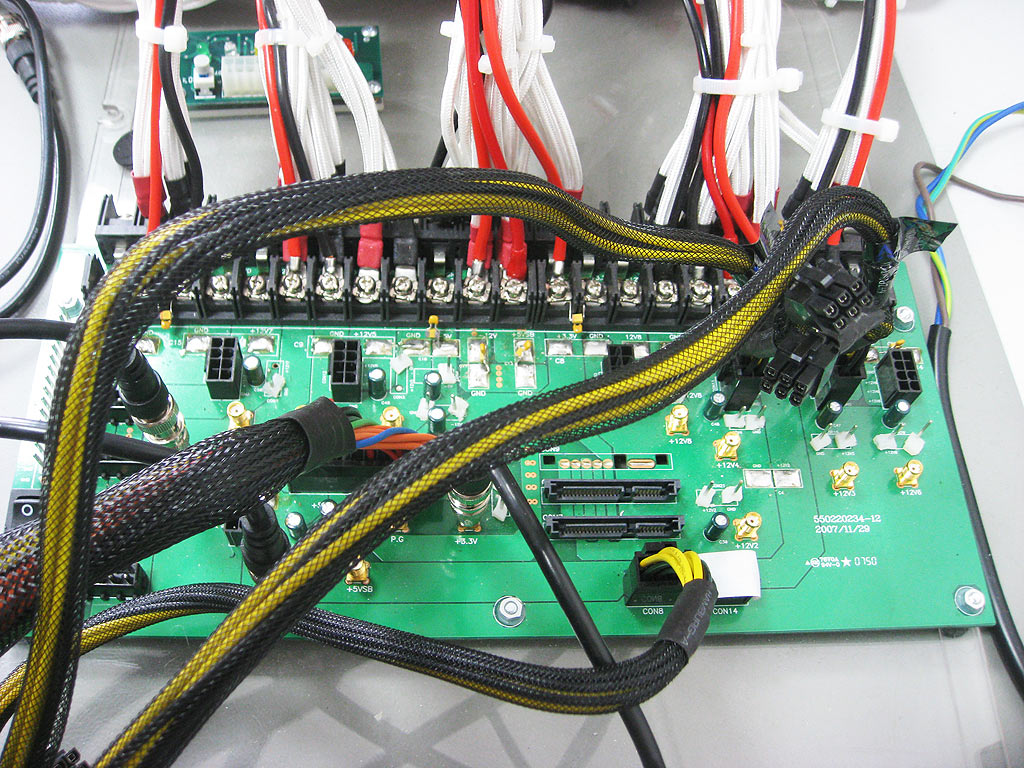Soon At Tom's Hardware: Full-Scale Power Supply Testing
Power Consumption In Standby Mode, Inrush Current, Energy Efficiency
Power Consumption in Standby Mode
As long as the power supply's main switch isn't turned off or the computer isn’t physically disconnected from the power grid, the PSU will consume some power even when shut down. This is called standby power and is required to turn on the PC.
Some computers even provide sufficient standby power to charge a cell phone through a USB port. A constant load on the 5V standby rail (5Vsb) has to be defined and used in order to compare the standby power of different power supplies. We chose 0.25A, which equals a power consumption of 1.25W. The test result shows what the PSU actually consumes in order to provide the required 1.25W. The higher the number, the lower the quality of the power supply in this respect.
Inrush Current
Turning on a computer creates a very strong temporary peak in its input current due to the charging of capacitors and so on. If the inrush current is too high, this could negatively impact other devices connected to the same power strip or even the local power grid if they are really sensitive.
Tom's Hardware tests each PSU to make sure its inrush current stays within the ATX specification of 50A at 230V and 100A at 115V. Our 150A Tektronix TCP150 probe enables us to gather helpful screenshots.
Energy Efficiency According to the 80 PLUS Specification
Get Tom's Hardware's best news and in-depth reviews, straight to your inbox.
Next to its power output, the most important characteristic of a PSU is efficiency. It's no surprise, then, that almost every PSU manufacturer out there today advertises the compliance of its products with the 80 PLUS certification. A PSU must reach a certain efficiency under given load percentages in order to use this label.
The different levels (standard, Bronze, Silver, and Gold) symbolize what efficiency level for which the PSU is suitable. The next certification, Platinum, is already in preparation. 80 PLUS has its main focus set on 50% loads, which are most common in everyday use. Tom's Hardware tests whether PSUs are labeled correctly or if certified models comply with the requirements of the 80 PLUS initiative. Since the certification enjoys worldwide recognition, all tests are carried out at voltages of 115V, as well as 230V.
The table shows the criteria the individual 80 PLUS levels are based on.
| Energy Efficiency | 20% Load | 50% Load | 100% Load |
|---|---|---|---|
| 80 PLUS | 80% | 80% | 80% |
| 80 PLUS Bronze | 82% | 85% | 82% |
| 80 PLUS Silver | 85% | 88% | 85% |
| 80 PLUS Gold | 87% | 90% | 87% |
| 80 PLUS Platinum | 90% | 94% | 91% |
Energy Efficiency Under a Range of Defined Loads
In addition to the efficiency testing done to check the 80 PLUS compliance, we also test the efficiency of power supplies under a number of defined loads. This allows the user to get a picture of PSU efficiency under a range of typical loads. To depict the most realistic scenarios possible, the following loads are used:
- 25W: Compact all-in-one Atom-based PC without a dedicated graphics card
- 50W: Office PC without a dedicated graphics card
- 85W: Multimedia PC with a dedicated graphics card
- 300W: Gaming PC with a powerful CPU and a modern graphics card
- 500W: Gaming PC with a high-end CPU and multiple graphics cards
Current page: Power Consumption In Standby Mode, Inrush Current, Energy Efficiency
Prev Page Test Method: High-Precision Measurement Instruments Next Page Hold Up Time, Overload And Short Circuit Test, Temperature-
JonnyDough I second what gamer-girl said, and although this is exciting I'm still awaiting the Graphics Comparison Charts! I realize this is more of an IT website, but these days everyone's a gamer of some type! Long live PC gaming!Reply -
baracubra Wow, great idea and article! This will be a huge help and I'm glad u guys took the time and effort to put this together! Long live TH!Reply -
take the good ideas from some other nice psu reviewersReply
http://www.jonnyguru.com/modules.php?name=NDReviews&op=Story&reid=153 -
joytech22 I hope they do a large comparison, i want to see how my Antec TPQ 1Kw stacks up to some of the other manufactures.Reply -
gege take the good ideas from some other nice psu reviewersReply
www.hardwaresecrets.com/page/power -
liquidsnake718 Bravo, good choice for a new section as more consumers and buyers should be aware of the power supplies and the quality/preformance that they offer us. I myself am about to change my older PSU and will be waiting to read the first comparisons. The problem is, which ones will you choose and every month will you have a power category? For example all the 500-600watts, then following the 700-800, 1000w onwards, ect.Reply
You might even succeed in killing off generic psu's or at least make more ppl buy 80 plus or 80plus bronze psu's....
